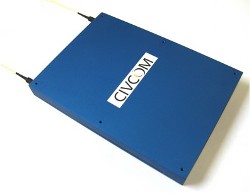Mar 18 2010
Civcom, a leading technology developer and manufacturer of Opto-electronic components and modules, today announced the availability of a new DPSK tunable 40G transponder as the latest complement to its 10Gbps Free Light family of tunable NRZ and RZ transponders.
 40Gbps DPSK transponder
40Gbps DPSK transponder
Civcom's 40Gbps 300PIN TRX module will be made available in two different packages:
- Small Form Factor (5" x 5") featuring standard DPSK modulation format and optional integration with an EDFA
- Standard MSA size (7" x 5") featuring integrated tunable DCM and EDFA functionality
"We are proud to introduce the industry's first integrated 40Gbps DPSK transponder, which is built specifically to address the challenging market demands for additional network capacity," stated Yair Itzhar, VP of Worldwide Sales and Marketing at Civcom. "By integrating our tunable optical dispersion compensation component within the module, manufacturers can effectively increase dispersion tolerance of the transponder while reducing overall cost."
Civcom's TRX DPSK module increases dispersion tolerance from the standard ±40ps/nm to as high as ±640ps/nm. The introduction of integrated EDFA increases the dynamic range to 20dB.
The transponder module, which is compatible with the 300PIN MSA standards and I2C standards, uses a widely tunable laser covering the entire C-Band.
Civcom will participate at OFC/NFOEC 2010 Trade Show, Booth #909 (23-25 March, 2010) San Diego, CA, USA.
Source: http://www.civcom.com